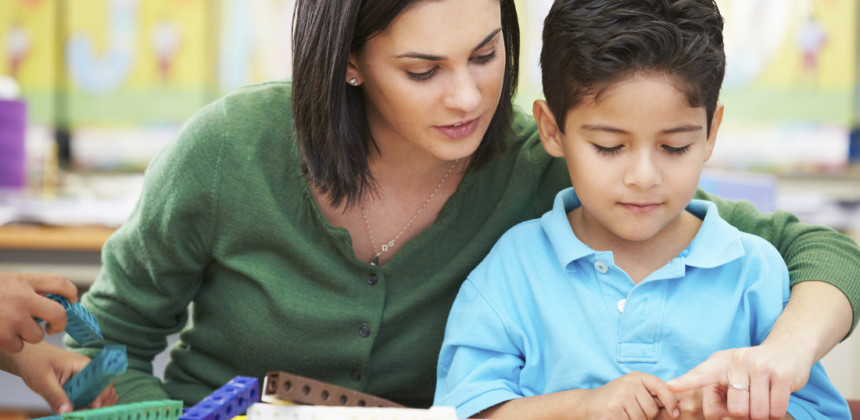What Does Math Literacy Mean?

We all know how literacy skills develop: first, we learn sounds and then letters, then combine them to form words and sentences, and eventually, we fully comprehend written language. These literacy skills are crucial for academic success, helping students understand and communicate ideas effectively.
However, the process of becoming math literate is less commonly understood, though it’s just as important to students’ success in school and beyond. So, what does math literacy really mean?
What is Math Literacy?
Math literacy, or numeracy, is the ability to problem-solve, reason, and analyze using numbers. It goes beyond basic arithmetic and is essential for applying math in real-world situations. Math literacy enables students to understand math terminology (such as knowing that “sum” means addition and “difference” means subtraction) and decode what a question is actually asking.
Mastering math literacy means students can use numbers effectively, understand patterns, and apply logical reasoning to solve everyday problems.
When Do Students Become Math Literate?
Students reach math literacy after they’ve mastered fundamental math skills such as addition, subtraction, multiplication, and division. Mastery of fractions by the end of Grade 5 is also crucial; without it, students will likely struggle with more complex math concepts in high school and beyond.
Math literacy isn’t an instant achievement—it requires years of understanding and applying math concepts. Interestingly, the brain’s ability to comprehend abstract logic fully matures during adolescence, which is often why high school becomes the real testing ground for math skills. Students who are solid in the basics can move more seamlessly into advanced math.
Common Challenges in Developing Math Literacy

Math literacy often comes with its own set of hurdles. Many students struggle to recognize patterns and apply learned skills in new situations. Word problems are a common stumbling block, as students may struggle to interpret the question and identify the steps needed to reach a solution.
Abstract thinking is also an essential skill in math, yet it doesn’t come naturally to everyone. This is why extra support and encouragement are key for students who find math challenging. Extra tutoring support can help students overcome any math problems that they may be facing. Learn more about math tutoring here.
When Can a Student Consider Themselves Math Literate?
There is no specific age at which students achieve math literacy. They achieve it when they can confidently use math concepts, recognize patterns, and transfer skills to solve problems. Math literacy is more than just completing assignments—it’s a way of thinking and solving problems in everyday situations.
Tips for Improving Math Literacy Skills
It’s never too late to improve math literacy! Here are some effective ways to strengthen these essential skills:
- Revisit basic concepts.
- Understanding core mathematics, such as addition, subtraction, multiplication, division, and fractions, lays a solid foundation for tackling complex math skills.
- Fill math learning gaps early.
- The sooner students identify and address gaps, the greater the likelihood of becoming math literate.
- Relate math to real life.
- Math is everywhere, from cooking to home improvement to driving. Showing students how math applies to daily life makes it more relevant and engaging.
- Boost confidence and motivation.
- Positive experiences with math, such as small successes, can significantly impact a student’s confidence. Confidence, in turn, motivates them to tackle more complex problems.
- Provide real-world examples.
- When students ask, “When will I ever use this?” real-world examples—from art to computer science—can demonstrate the value of math in everyday life.
6 Fun Ways to Make Math Engaging at Home
If you’re looking to make math more enjoyable for kids, here are six fun ideas:
- Use math in cooking; measuring ingredients helps with fractions and multiplication.
- Play board games with math elements. Games like Monopoly or Yahtzee encourage counting, strategy, and probability.
- Tracking fitness goals can help kids set and measure their personal bests for physical activities.
- Design a home project that encourages kids to calculate paint or flooring needs for a room—it’s a real-life application of area measurement.
- Solve puzzles and brain teasers together; this helps build critical thinking.
- Explore math in nature, looking for patterns in leaves, shapes of rocks, and weather patterns, all using math concepts.
Developing math literacy is a journey that requires practice, patience, and positivity. By understanding and embracing the “language of math,” students not only improve academically but also gain vital skills for navigating the world around them.
Need Help Building Math Skills?
Oxford Learning can support your child on the path to math literacy! Our programs are designed to boost confidence and understanding, making math accessible and enjoyable.
Find an Oxford Learning location near you to get started today!




